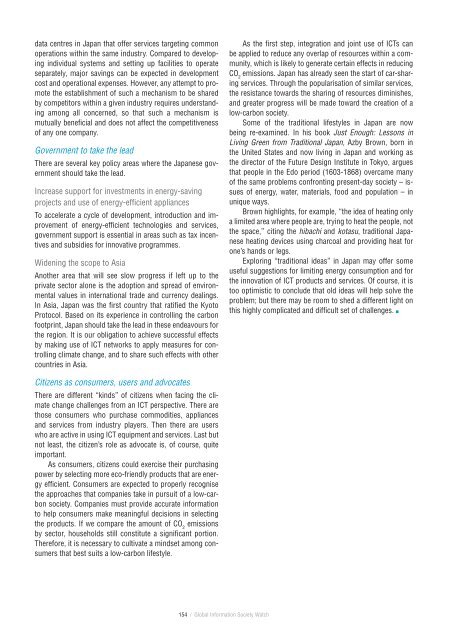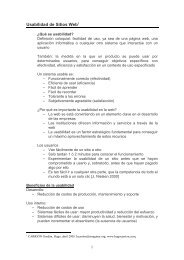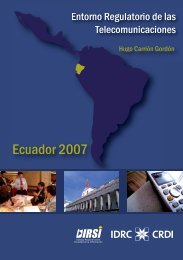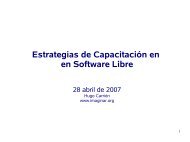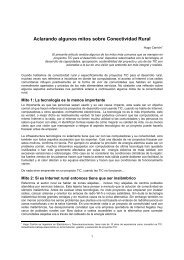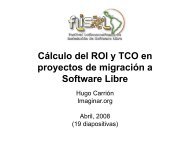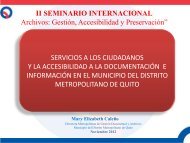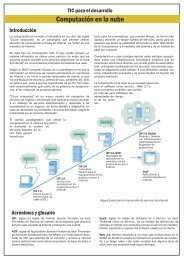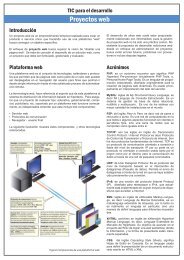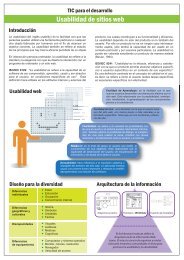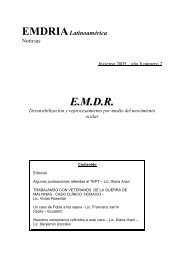GLOBAL INFORMATION SOCIETY WATCH 2010
GLOBAL INFORMATION SOCIETY WATCH 2010
GLOBAL INFORMATION SOCIETY WATCH 2010
Create successful ePaper yourself
Turn your PDF publications into a flip-book with our unique Google optimized e-Paper software.
data centres in Japan that offer services targeting common<br />
operations within the same industry. Compared to developing<br />
individual systems and setting up facilities to operate<br />
separately, major savings can be expected in development<br />
cost and operational expenses. However, any attempt to promote<br />
the establishment of such a mechanism to be shared<br />
by competitors within a given industry requires understanding<br />
among all concerned, so that such a mechanism is<br />
mutually beneficial and does not affect the competitiveness<br />
of any one company.<br />
Government to take the lead<br />
There are several key policy areas where the Japanese government<br />
should take the lead.<br />
Increase support for investments in energy-saving<br />
projects and use of energy-efficient appliances<br />
To accelerate a cycle of development, introduction and improvement<br />
of energy-efficient technologies and services,<br />
government support is essential in areas such as tax incentives<br />
and subsidies for innovative programmes.<br />
Widening the scope to Asia<br />
Another area that will see slow progress if left up to the<br />
private sector alone is the adoption and spread of environmental<br />
values in international trade and currency dealings.<br />
In Asia, Japan was the first country that ratified the Kyoto<br />
Protocol. Based on its experience in controlling the carbon<br />
footprint, Japan should take the lead in these endeavours for<br />
the region. It is our obligation to achieve successful effects<br />
by making use of ICT networks to apply measures for controlling<br />
climate change, and to share such effects with other<br />
countries in Asia.<br />
As the first step, integration and joint use of ICTs can<br />
be applied to reduce any overlap of resources within a community,<br />
which is likely to generate certain effects in reducing<br />
CO 2<br />
emissions. Japan has already seen the start of car-sharing<br />
services. Through the popularisation of similar services,<br />
the resistance towards the sharing of resources diminishes,<br />
and greater progress will be made toward the creation of a<br />
low-carbon society.<br />
Some of the traditional lifestyles in Japan are now<br />
being re-examined. In his book Just Enough: Lessons in<br />
Living Green from Traditional Japan, Azby Brown, born in<br />
the United States and now living in Japan and working as<br />
the director of the Future Design Institute in Tokyo, argues<br />
that people in the Edo period (1603-1868) overcame many<br />
of the same problems confronting present-day society – issues<br />
of energy, water, materials, food and population – in<br />
unique ways.<br />
Brown highlights, for example, ‘‘the idea of heating only<br />
a limited area where people are, trying to heat the people, not<br />
the space,’’ citing the hibachi and kotasu, traditional Japanese<br />
heating devices using charcoal and providing heat for<br />
one’s hands or legs.<br />
Exploring “traditional ideas” in Japan may offer some<br />
useful suggestions for limiting energy consumption and for<br />
the innovation of ICT products and services. Of course, it is<br />
too optimistic to conclude that old ideas will help solve the<br />
problem; but there may be room to shed a different light on<br />
this highly complicated and difficult set of challenges. n<br />
Citizens as consumers, users and advocates<br />
There are different “kinds” of citizens when facing the climate<br />
change challenges from an ICT perspective. There are<br />
those consumers who purchase commodities, appliances<br />
and services from industry players. Then there are users<br />
who are active in using ICT equipment and services. Last but<br />
not least, the citizen’s role as advocate is, of course, quite<br />
important.<br />
As consumers, citizens could exercise their purchasing<br />
power by selecting more eco-friendly products that are energy<br />
efficient. Consumers are expected to properly recognise<br />
the approaches that companies take in pursuit of a low-carbon<br />
society. Companies must provide accurate information<br />
to help consumers make meaningful decisions in selecting<br />
the products. If we compare the amount of CO 2<br />
emissions<br />
by sector, households still constitute a significant portion.<br />
Therefore, it is necessary to cultivate a mindset among consumers<br />
that best suits a low-carbon lifestyle.<br />
154 / Global Information Society Watch


